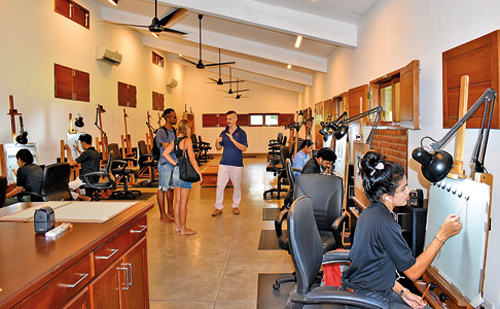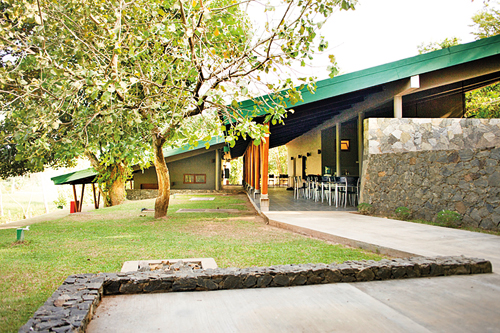Where apprentices learn of art and life

‘My lovely Grandmother’ Charcoal by N.B.W. Ruchini Rumesha
Matara is known for many things – ancient ramparts and well-preserved colonial Dutch architecture to name a few. But not Art.
Yet, hidden over five acres in a forested hillside in Dikwella lies the six-building campus of ÀNI Art Academies. Designed to blend naturally with the environment, there are no galvanised signages shouting its presence or giving any indication of the creative gems being manifested within its walls. Students here (referred to as apprentices) pursue a lifetime of mastery, learning realism art forms such as trompe I’oeil and hyperrealism that are unrecognised in Sri Lanka these days.
ÀNI Academies’ understated ethos of letting the work speak for itself permeates everything. As the Dean of ANI Academies Sri Lanka, Timothy Jahn welcomes me to the main studio, I am drawn to the stylised black and white photography displayed along the walls.
But my eyes deceive me, which is an intention of the work created. These images are actually meticulous pencil drawings – assignments by apprentices studying realism art forms such as trompe l’oeil (the French phrase meaning ‘deceives the eye’).
I am struck by the cleanliness and organisation of the studio – the creative chaos of scattered materials and students daubed with paint flecks — is nowhere to be seen.
“Before an apprentice even picks up a pencil, they are taught the discipline of how to set up and care for their tools, their easels and their space,” Dean Jahn explains.
This methodology of teaching art to inculcate valuable life lessons, was developed by American contemporary fine artist and educator Anthony J. Waichulis.
Apprentices start learning fundamentals like how to properly hold a pencil and competently draw a straight line. They progress to perfecting the execution of other shapes: spheres, cones, and cubes etc. and understanding the principles of light, draftsmanship and visual perception. The level of competency in these fundamentals can take years to achieve, but Dean Jahn explains that this is the key to creating fine art to the level of excellence that ÀNI Academies is known for.
The course takes a minimum of three years. Dean Jahn himself took three and a half years to complete it, studying directly under Waichulis.

State of the art: Dean Timothy Jahn (centre) with students at the main studio
“A big part of doing well on this course is about showing up every day and dedicating time and effort to the work. We open from 7 a.m. to 5 p.m. and have students starting at 7.30, working six full days a week. We provide lunch, morning, and afternoon tea. Apprentices are responsible for organising their work time to reach the levels of competency they need to progress.”
“Effort Creates Talent” is written above the studio entrance to remind the class that their commitment to the process rather than any natural talent is what pays dividends.
Studying at their own pace, class sizes tend not to exceed 25. This ensures each apprentice getting the personal attention and mentoring needed to develop. Students come from across the country – from Galle to Polonnaruwa and free accommodation is provided at the male and female hostels nearby.
Enrolment to this high-quality international course is free: adult students who have completed O’ Level education in any subjects, can apply. I asked about selection criteria and whether drop-out rates were high for such an intensive course.
“People who cannot commit to the programme are eventually asked to leave, and I can generally tell in the first week which apprentices are not going to make it. But I have also been surprised by some, because the course is a marathon not a sprint. It is not necessarily the most gifted person that does well. You can have an apprentice with limited aptitude who puts in the work and over the years will outshine the naturally gifted artist easily. It’s all about being prepared to work smart – not just hard. This is something that we teach here through art. I’m looking for someone who is determined to do Art even when they’ve been discouraged from doing it (like the former maths A Level student in the current class). There is something valuable in that level of commitment. I’m looking for the person who lights up when they see what we do and says, ‘I want to do that’.”

On a forested hillside in Dikwella: The sprawling ÀNI Art Academies’ campus
Surely tech-savvy students today prefer the quicker route of digitally creating figurative art with a computer programme, rather than spending years intensively training? Dean Jahn explained that apprentices have access to a state-of-the art digital lab once they had completed their skills competency.
“Once you understand the how and why of the specialism and have mastered the skills to create the images without relying on a computer programme, using digital applications becomes an additional tool. But your art is still governed by your skills, not the ability of the computer programme.”
A representational fine artist/educator himself, Timothy Jahn graduated from New Jersey’s duCret School of Art in the US, where he later taught. Still creating his own art whilst he teaches, Jahn finds that teaching has a massive positive effect on his own work.
“When apprentices ask me a question that I don’t know the answer to, I tell them that I don’t know, but I’ll find out for them, and I learn myself in the process. Whilst teaching at duCret I had a student who wanted to learn about trompe l’oeil. Not knowing much about it myself, I reached out to Anthony Waichulis. and asked if I could bring my students to see his work.”
That field trip led to Jahn himself becoming Waichulis’s apprentice. The impact of the Waichulis Method on his own work, led to him connecting Waichulis with the Founder of ÀNI Art Academies, Tim Reynolds to create this non-profit arts education programme for aspiring artists around the world. The Academy currently has six international campuses: ÀNI America and Waichulis in the U.S. and Thailand, Sri Lanka (started in 2018) and Anguilla, where Jahn was the former Dean.
As the course is taught in English, I wondered how apprentices coped.
“My current translator Nuwani Gunawardhana is doing the programme herself, so translation is much easier than previously when translators would translate my words without understanding the teaching. I give Nuwani the freedom to interpret my teachings in a way that best communicates them to the apprentices.”
Nuwani says the training has literally changed her whole outlook on life. “I notice tiny details on everyday things that I have never noticed before – even on the simplest objects that I have been using all my life, the way I see them has now changed.”
I asked Jahn how apprentices schooled in Sri Lanka’s rote-learning, exams-based education system coped with the creative phase of the programme. “Early exposure to free thinking, in school primes you to think creatively. But if you have never had that freedom and suddenly you come to a class like this, where you must make all the decisions about your subject, you struggle having never been exposed to that decision-making before. Apprentices are often timid about their choices, and I have to encourage bolder experimentation in developing their ideas. We encourage them to create within the parameters of the competencies. We’re teaching them to flow between the realms of conformity and creativity.”
The programme also teaches apprentices how to generate income from their skills.
“We teach how to write emails, resumes and how to follow-up and present their work to high-end buyers. We also teach them how to ship, light and store work. Their art should aspire to the level of the Mercedes not the three-wheeler.
“Everything they need to know to sell their work is taught at a very high level so that they are not doing something cheap which hurts them in the long term, because once you lower your quality and your price it is very difficult to come back up.”
ÀNI Academies Sri Lanka is open for enrolment now. To find out more, visit https://aniartacademies.org/sri-lanka/
Searching for an ideal partner? Find your soul mate on Hitad.lk, Sri Lanka's favourite marriage proposals page. With Hitad.lk matrimonial advertisements you have access to thousands of ads from potential suitors who are looking for someone just like you.


